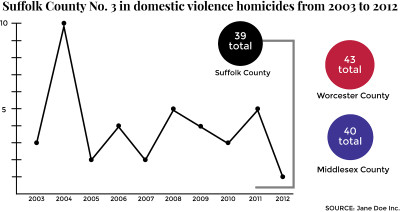
Suffolk County had the third highest rate of domestic violence homicides in Massachusetts between 2003 and 2012, according to a report released by Friday by Jane Doe Inc.
From Jan. 1, 2003 to Dec. 31, 2012, there were a total of 334 deaths in Massachusetts as a result of domestic homicide, according to the report. Suffolk County had 39 homicide incidents related to domestic violence, behind Middlesex County (40) and Worcester County (43).
“When domestic violence is unaddressed, or when it is inadequately addressed, it can escalate along predictable lines and end, tragically, in homicide,” the report stated. “JDI presents this report to honor the lives of people murdered by abusers as well as the surviving children, family, friends, and colleagues of the victims and perpetrators whose lives have been irrevocably changed.”
Toni Troop, lead author of the report, said JDI, a statewide advocacy coalition against domestic violence, has been collecting data since the early 1990s, but that the past ten years have proven different with information gathering.
“Typically, we put out an annual list that provides a brief narrative of the person that was killed. We have opted to dig a little deeper into these cases,” Troop said. “We wanted to choose a ten year period, so we started on this a few years ago, [and] we needed to choose a range of dates that was going to be manageable.”
The organization had to wait to release these data, Troop said, to have a better understanding of the criminal implications that resulted from deaths.
“Some of those cases hadn’t yet gone through criminal justice process, and a lot of the information wouldn’t have been made public at this point,” Troop said. “With data, you’re often looking two to three years back, because you need time to gather and analyze the data and write the report.”
Whenever there is a homicide that may be related to domestic violence, JDI gathers data by staying in touch with member programs and the District Attorney’s offices, Troop said. The organization also retrieves data by searching through media sources, she said.
JDI focuses on prevention, policy, training and social justice, and offers education and services from Cape Cod to the Berkshires. Troop said that the organization hopes to use this report as a mechanism for advocating preventative methods to stop domestic abuse.
Addressing problems that contribute to domestic violence, Troops said, is a goal of JDI.
“Not all violence is perpetrated by men, and men themselves can be victims. We believe there is an underlying issue of sexism and patriarchy compounded by other oppressions such as racism are what result in sexual and domestic violence,” Troop said. “So if we can dig deeper and undo those values or shift those values and undo those oppressions, we believe wholeheartedly that we will see a decrease in sexual and domestic violence.”
Several residents said they were surprised at the results, but that they ultimately hope to see a change in these statistics in the future.
Gloria Durrane, 69, of Jamaica Plain, said she felt that the state is not doing enough to prevent in-home violence.
“The state doesn’t care. They truly don’t care,” she said. “There should be more services for people who experience domestic violence. I think the state is remiss in [not] having programs to help people who are involved in this type of thing.”
Rose Cooper, 43, of Mattapan, said that the media should focus more on domestic violence in addition to mainstream topics.
“We do [talk] about kids that get shot out in the street, amongst each other, amongst the cops,” she said. “We discuss that because it’s mainstream, it’s in the media. I think if it was more out there and it was in the newspapers more and in the news more, there would be more discussion, which would lead to [more awareness].”
Moe Atkinson contributed to the reporting of this article.














